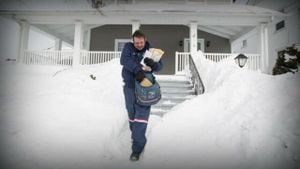The tragic story surrounding John Smyth, the British barrister turned child abuser, continues to haunt many lives, particularly those connected to his summer camps in Zimbabwe. Amid these shadows, one family's pain stands out. Edith Nyachuru speaks to this experience with fierce conviction, pinpointing the Church of England's complicity and questions the very foundation of the trust placed by parents who enrolled their children at Smyth’s camps.
Edith Nyachuru’s younger brother, Guide, was only 16 when he drowned during what was supposed to be a fun-filled week at his brother’s camp run by Smyth. "I blame the Church for my brother’s death," she shared, asserting her belief the Church knew of Smyth’s abusive past and chose to do nothing about it. "They should have stopped him. Had they stopped him, I think my brother would still be alive," she lamented.
Backtracking to the late 1980s, Smyth had already established himself as someone to be wary of when he moved his family to Zimbabwe. His notoriety began long before his arrival, highlighted by the chilling report written by Anglican clergyman Mark Ruston, which detailed the extensive child abuse Smyth subjected to boys at Christian camps. This 1982 report unveiled moments of violence and trauma, with details so unsettling they described boys needing to wear diapers to cope with their physical injuries. But shockingly, very few outside the Church circle were made aware of this document.
Setting up Zambesi Ministries shortly after moving to Zimbabwe, Smyth rented his cherished camp model after similar operations he had run in the UK, and with little oversight or scrutiny, he quickly became popular among local elite schools. Many parents found themselves easily persuaded by flyers and promises of summer joy without realizing the sinister undertones lurking behind them.
Edith recalls how her brother came to attend the camp where he lost his life. A gift from one of his sisters, the camp seemed like a good opportunity for adventure, complete with promises of thrilling activities and camaraderie. Just hours after arriving, on December 15, 1992, the family received the fateful call about his tragic death. "Within 12 hours of him being dropped at the camp, we received the news he had died," Edith recounted, still struggling to reconcile the sudden loss.
Witnesses conveyed disturbing details about the night of Guide’s drowning, stating he and the other boys swam naked—part of the camp's bizarre traditions—before bedding down for the night. While the boys returned to their dormitories, they did not notice Guide’s absence until the unthinkable happened. His lifeless body was discovered submerged the next morning. The tragedy marked the Nyachuru family forever; Edith describes her brother as “the youngest of seven siblings and the only boy,” and held immense affection from his family.
“He was very loved by everyone. A lovely boy... Guide was due to be made head boy the following year,” she reminisced fondly. What shocked the family even more was the indecent dress condition under which they were prohibited from viewing their beloved Guide’s body. Officers cited his naked state as the reason, leaving Edith and her kin devastated and confused.
Smyth's infatuation with nudity would rear its ugly head time and again at the camps. Many attendees shared discomfort at his openly casual approach to clothing—or lack thereof. Reports circulated about Smyth roaming the boys’ dormitories completely unclothed. A former camper shared, "He promoted nakedness and encouraged the boys to walk around naked at the summer camp," pointing to how the youth found it normal under Smyth’s rule.
Disturbing practices permeated the camp beyond just nudity. Former attendees remarked on Smyth’s inappropriate activities, including leading prayers nude and participating in what he termed “flappy jumping” which involved naked trampoline sessions. Accounts from those who suffered at his hands emerged over the years. A parent approached Zimbabwean lawyer David Coltart, seeking answers after her son returned from the camp bruised and battered. For others, such abusive discipline came to feel vaguely normal, rooted as it was in the culture of corporal punishment prevalent among boarding school students.
Coltart launched his own investigation, quickly realizing the gravity of the situation surrounding Smyth. He coordinated with different church leaders, aiming to curb Smyth’s influence as allegations escalated. The horror and shock were exacerbated when he discovered the Ruston report's findings, leaving him no option but to confront Smyth and demand the camps cease. "It was calculated, he focused on boys. He groomed young men," Coltart noted, referencing the long pattern of abuse and control Smyth, as described by his alters.
Despite Coltart's well-documented warnings and backed by psychological advice asserting Smyth’s need to stop working with children, Smyth attempted to regain his control. Facing serious accusations, he communicated with parents attempting to normalize his conduct. Smyth brazenly dismissed the acts as mere discipline, likening the beatings he dished out to be harmless, even placing them under the guise of 'spiritual discipline'—a euphemism he commonly used.
Following the report's publication in late 1993, Smyth’s operation continued, albeit behind closed doors. Coltart's efforts did see some victories, with Smyth momentarily being knocked off balance, but numerous hurdles lay before effectively prosecuting the case against him. A charge of culpable homicide was made against Smyth, related to Guide’s drowning, but the situation spiraled, leading to chaotic police inquiries muddled by lost documents and the removal of prosecutors.
Years passed without justice—Edith lamented omissions during the investigation, like neglecting to carry out any post-mortem examinations on Guide’s body. The culture of favoritism and connection allowed Smyth to navigate legal troubles more gracefully than his victims. He maintained significant ties with influential figures, even reportedly lobbying former President Robert Mugabe himself to evade punishment.
Despite the heart-wrenching fallout, the story seems to be gaining traction now, echoed by several voices as more survivors come forward with similar accounts of trauma. Smyth's actions, entrenched deeply within the practices of the Church, have laid bare the vulnerability of youth under adult dominion. Now, as more people expose their stories, the haunting legacy of John Smyth raises tough questions about accountability, especially surrounding institutions tasked with protecting the vulnerable. Will these revelations inspire real change, or are they merely whispers against the wind?



